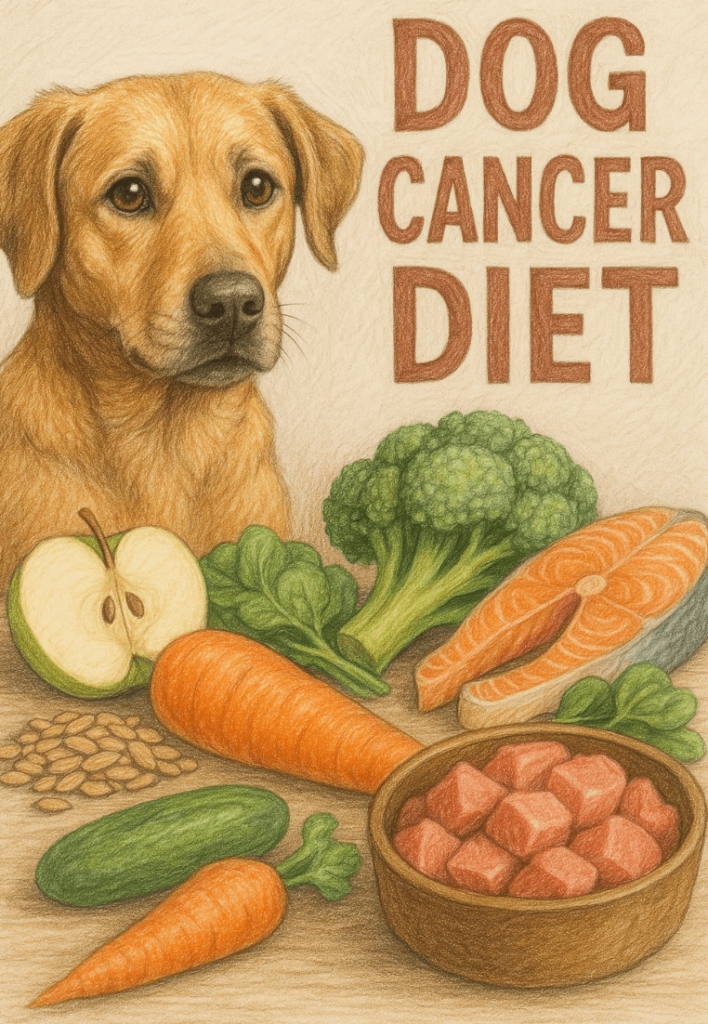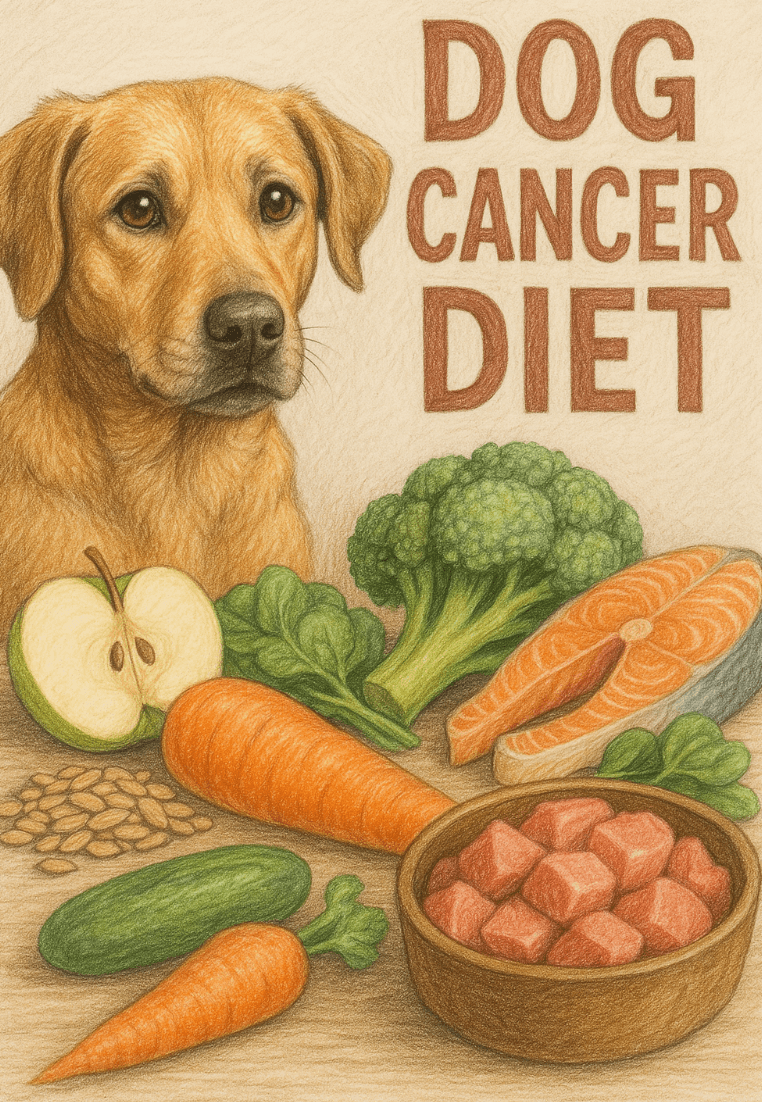Dog Cancer Diet: Supporting Your Furry Friend Through Nutrition
When a dog is diagnosed with cancer, it can be a heart-wrenching experience for any pet owner. While veterinary treatments like chemotherapy and surgery are often necessary, nutrition plays a crucial role in supporting your dog’s overall health and well-being during this challenging time. A carefully planned dog cancer diet can help boost their immune system, maintain strength, and improve their quality of life. But what does a cancer-fighting diet look like for dogs? In this blog post, we’ll explore the best foods, supplements, and dietary strategies to support your beloved companion through their journey.
Key Principles of a Dog Cancer Diet
A cancer-supportive diet focuses on providing high-quality nutrients that nourish your dog’s body while avoiding ingredients that may promote inflammation or stress their system. Here are some essential principles to keep in mind when planning meals for your dog.
Prioritize High-Quality Protein:
Protein is vital for maintaining muscle mass and supporting immune function. Opt for lean meats like chicken, turkey, or fish, ensuring they are cooked thoroughly.Include Healthy Fats:
Omega-3 fatty acids, found in fish oil or flaxseed, have anti-inflammatory properties that can benefit dogs with cancer.Limit Carbohydrates:
Cancer cells thrive on sugar, so reducing carbohydrates, especially refined ones, can help starve these cells and support your dog’s health.Add Antioxidant-Rich Foods:
Vegetables like spinach, kale, and carrots are packed with antioxidants that combat free radicals and support cellular health.Avoid Processed Foods and Additives:
Processed ingredients, artificial preservatives, and fillers can burden your dog’s system, so stick to natural, whole foods whenever possible.
By following these principles, you can create a balanced and supportive diet tailored to your dog’s specific needs.
Foods to Include in a Dog Cancer Diet
Certain foods are particularly beneficial for dogs battling cancer due to their nutrient density and healing properties. Incorporating these into your dog’s meals can make a significant difference in their overall health.
Lean Meats:
Chicken, turkey, beef, and lamb provide essential amino acids and are easy to digest when cooked properly.Fish and Fish Oil:
Salmon, sardines, and mackerel are excellent sources of omega-3 fatty acids, which reduce inflammation and support joint health.Leafy Greens:
Spinach, kale, and broccoli are rich in vitamins A, C, and K, as well as fiber, which aids digestion.Pumpkin and Sweet Potatoes:
These vegetables are gentle on the stomach and provide slow-digesting carbohydrates along with essential vitamins.Blueberries and Apples:
Low in sugar and high in antioxidants, these fruits are safe treats that support immune function and overall vitality.
Including these nutrient-dense foods ensures your dog receives the building blocks they need to fight cancer and stay strong.
Check this guide 👉Dog Colon Cancer Symptoms: Best 7 Expert Tips!
Check this guide 👉Bladder Cancer in Dogs: Best 7 Expert Tips!
Check this guide 👉Spleen Cancer in Dogs: Best 7 Expert Tips!

Foods to Include in a Dog Cancer Diet | Foods to Avoid in a Dog Cancer Diet |
|---|---|
Lean proteins (chicken, turkey, fish) | Processed meats (bacon, sausages) |
Omega-3-rich fish oil | Sugary treats and snacks |
Antioxidant-packed vegetables (spinach, kale) | Artificial additives and preservatives |
Low-glycemic fruits (blueberries, apples) | High-carb grains (white rice, pasta) |
Pumpkin and sweet potatoes | Dairy products (if lactose intolerant) |
Supplements to Support a Dog Cancer Diet
In addition to whole foods, certain supplements can enhance your dog’s diet and provide additional support during cancer treatment. Always consult your veterinarian before introducing new supplements.
Omega-3 Fatty Acids:
Fish oil capsules or liquid supplements help reduce inflammation and support skin and coat health.Probiotics:
Probiotic powders or chews promote gut health, aiding digestion and boosting the immune system.Turmeric (Curcumin):
This powerful anti-inflammatory spice has been shown to inhibit cancer cell growth in some studies.Mushroom Extracts:
Medicinal mushrooms like reishi or turkey tail may strengthen the immune system and improve energy levels.Vitamin D:
Adequate vitamin D levels are linked to improved outcomes in cancer patients, but supplementation should be monitored by a vet.
These supplements can complement a cancer-fighting diet, helping your dog feel their best despite the challenges they face.
Signs Your Dog May Benefit from a Cancer Diet
Not all dogs with cancer exhibit obvious symptoms, but certain signs indicate that dietary changes could improve their condition. Look out for these indicators to determine if a specialized diet is needed.
Weight Loss or Muscle Wasting:
Unexplained weight loss or muscle deterioration may signal nutritional deficiencies that a cancer diet can address.Lethargy or Fatigue:
Dogs with cancer often feel tired or weak; a nutrient-rich diet can help restore energy levels.Poor Appetite:
Cancer treatments like chemotherapy can suppress appetite; enticing foods can encourage them to eat.Digestive Issues:
Vomiting, diarrhea, or constipation may indicate digestive distress that dietary adjustments can alleviate.Skin or Coat Changes:
Dry, dull fur or irritated skin can improve with a diet rich in healthy fats and antioxidants.
Recognizing these signs early allows you to take proactive steps in supporting your dog’s health through nutrition.
Common Mistakes to Avoid When Feeding a Dog with Cancer
Even with good intentions, mistakes in feeding can hinder your dog’s progress. Avoid these common pitfalls to ensure your dog benefits fully from their diet.
Overfeeding Treats:
Too many treats can lead to weight gain or disrupt nutrient balance; stick to healthy, portion-controlled options.Neglecting Hydration:
Dehydration can worsen symptoms; ensure fresh water is always available and consider adding moisture-rich foods.Ignoring Food Allergies:
Some dogs develop sensitivities; monitor for reactions and adjust ingredients accordingly.Skipping Vet Consultations:
Always consult your vet before making major dietary changes to ensure safety and efficacy.Relying Solely on Supplements:
Supplements should complement, not replace, a balanced diet focused on whole foods.
Avoiding these mistakes ensures your dog’s diet remains effective and supportive throughout their journey.
How to Transition Your Dog to a Cancer-Friendly Diet
Switching your dog’s diet requires patience and care to avoid digestive upset. Follow these steps for a smooth transition.
Introduce New Foods Gradually:
Mix small amounts of new food with their current diet, increasing the proportion over 7-10 days.Monitor for Reactions:
Watch for signs of allergies, intolerance, or discomfort, such as vomiting or diarrhea, and adjust as needed.Keep Meals Consistent:
Maintain consistency in ingredients to prevent confusion or digestive issues during the transition.Offer Variety Within Safe Limits:
Rotate protein sources and vegetables to keep meals interesting without compromising nutritional value.Stay Patient:
Some dogs take time to adjust to new flavors and textures; persistence pays off in the long run.
A thoughtful transition ensures your dog adapts well to their new, cancer-supportive diet.
Tips for Encouraging Picky Eaters During Cancer Treatment
Cancer and its treatments can affect your dog’s appetite, making mealtime challenging. These tips can help entice even the pickiest eaters.
Warm Up Their Food:
Heating food slightly enhances aroma and flavor, making it more appealing to dogs with reduced appetites.Use Broth or Gravy:
Adding low-sodium broth or bone broth can make dry food more palatable and encourage eating.Hand-Feed Small Portions:
Offering small bites by hand creates a bonding experience and encourages reluctant dogs to eat.Experiment with Textures:
Some dogs prefer soft, mushy foods, while others enjoy crunchy kibble; find what works best for your pup.Stick to a Routine:
Regular feeding times help establish predictability, reducing stress and encouraging regular eating habits.
With creativity and patience, you can help your dog enjoy their meals again, even during tough times.
Frequently Asked Questions About Dog Cancer Diets
Can diet cure my dog’s cancer?
While no diet can cure cancer, proper nutrition supports overall health and enhances the effectiveness of treatments.
How often should I feed my dog during cancer treatment?
Smaller, more frequent meals are often easier for dogs undergoing treatment to digest and enjoy.
Is a raw diet safe for dogs with cancer?
Raw diets can be nutritious but pose risks of bacterial contamination; consult your vet before switching.
What human foods are safe for dogs with cancer?
Lean meats, cooked vegetables, and low-sugar fruits are generally safe; avoid toxic foods like onions, garlic, and chocolate.
Should I cook food at home or buy commercial dog food?
Both options can work, but homemade meals allow for more control over ingredients and nutrient balance.
Empowering Your Dog Through Nutrition
A dog cancer diet isn’t just about feeding your pet—it’s about giving them the tools they need to fight cancer and thrive despite the odds. By focusing on nutrient-dense foods, avoiding harmful ingredients, and incorporating supportive supplements, you can play an active role in your dog’s healing journey. Remember, every dog is unique, so tailor their diet to their specific needs and always consult your veterinarian for guidance. With love, care, and the right nutrition, you can help your furry friend live their best life, even in the face of adversity.
Do Cats Have Taste Buds? Best 7 Expert Tips! – Discover how cats experience flavors and why their taste is so unique.
Do Dogs Have Taste Buds? Best 7 Expert Tips! – Discover how dogs experience taste, their preferences, and what it means for their diet and health.
Can Cats Taste Sweet? Best 7 Expert Tips! – Discover why cats can’t taste sweetness, how it affects their diet, and tips to keep them healthy and happy.
Can Dogs Taste Sweet? Best 7 Expert Tips! – Discover how dogs perceive sweetness, which foods are safe, and tips to manage their sweet cravings responsibly.





